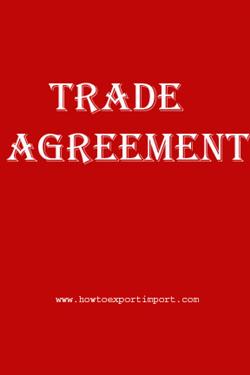 Explain Trade agreement
Explain Trade agreement
A trade agreement is a contract/agreement/pact between two or more nations that diagrams how they will cooperate to guarantee mutual benefit in the field of trade and investment. They decide the tariffs and duties that countries impose on imports and exports. All trade agreements influences international trade.
Trade agreements are significant because different countries have relative advantages in the production of certain goods. When one country produces a good that another country needs, the trade agreement is straight forward; both countries benefit by granting open trade of that good. The producing country gains access to new consumers and the importing country gains access to required goods. The other benefits of Trade Agreement like, reducing tariff barriers leads to trade creation, Increased exports, Economies of scale, Increased competition, Make use of surplus raw materials etc.
There are three types of trade agreements. Unilateral, Bilateral, and Multilateral Agreements
Unilateral Agreements
Unilateral free trade simply means that one country reduces its import restrictions without any formal agreement for reciprocation from its trade partners. They are trade incentives an importing country offers in order to urge the exporting country to engage in international economic activities that will enhance the economy of exporting country. A unilateral trade agreement is technically not an agreement, but the actions of one country to expand its market and reform its economy. Commonly, unilateral initiatives are offered to developing countries or countries that are encouraged to steer away from export of illegal drugs. The incentives typically include reduced duty rates, for which the exporting country will eligible if certain thresholds are met. The most common program is the General System of Preferences, an almost global program where the developed/wealthier countries give trade incentives, including duty rate reductions, to the developing countries.
In unilateral, other nations have no choice in the matter. It is not open to negotiation. It doesn't require other nations to do the same.
Bilateral Agreements
Bilateral trade agreements are between two countries. Both countries consent to extricate trade restrictions to grow business opportunities between them. They set rules of trade between two countries. The agreements may be limited to specific goods and services or certain types of market entry barriers. They lower tariffs and confer preferred trade status with each other. The sticking point usually centers around key protected or subsidized domestic industries. Different types of agreements define the level of the international integration from free trade to customs and economic unions.
Multilateral (or Regional) Agreements
Multilateral trade agreements are among three countries or more. These are the most difficult to negotiate. They set rules of trade between several countries. The greater the number of participants, the more difficult the negotiations are. They are also more complex, since each country has its own needs and requests. Multilateral agreements shape international trade unions, such as WTO, EU, NAFTA, etc. Once negotiated, multilateral agreements are very powerful. They cover a larger geographic area. That confers a greater competitive advantage on the signatories. All countries also give each other most favored nation status. They agree to treat each other equally.
Learn Exports Imports Free, Click here
Click here to know GST rate of your goods or service
How does Bill of Lading work in Sight LC
Transferability of Bill of Lading
Transhipment - A redefinition
Triangular shipment
Types of Insurance Documents
How does CENVAT Credit work?
Import General Manifest (IGM)
Importance of Bill of Lading
Is Airway bill a documents of title?
Is Customs House Agents (CHA ) required to be appointed mandatory?
Is DP terms of payment safe in export business?
Is Letter of Credit LC safe for an Importer?
How to export from Ghana?
How to import to India from Ghana?
How to Import to Ghana?
How to export from Georgia?
How to Import to Georgia?
How to import to India from Georgia?
How to export from India to Georgia?
Section 90 Liability of partners of firm to pay tax, CGST Act, 2017
Liability of agent and principal, Sec 86 of CGST Act, 2017
Provisional attachment to protect revenue in certain cases, Sec 83 of CGST Act, 2017
Recovery of tax, Section 79 of CGST Act, 2017
GST exemptions for SME
GST, Composition scheme changes
Tax wrongfully collected and paid to Central Government or State Government, Sec 77 of CGST Act, 2017
Section 74 Determination of tax not paid, CGST Act, 2017
Officers to assist proper officers, Sec 72 of CGST Act, 2017
Inter State supplies under GST
Meaning of Interstate dealer and seller
Inter State B2C Supply Means
Meaning of term Inter-State Goods and Service Tax (IGST) under GST
Inter and Intra State Level tax under GST